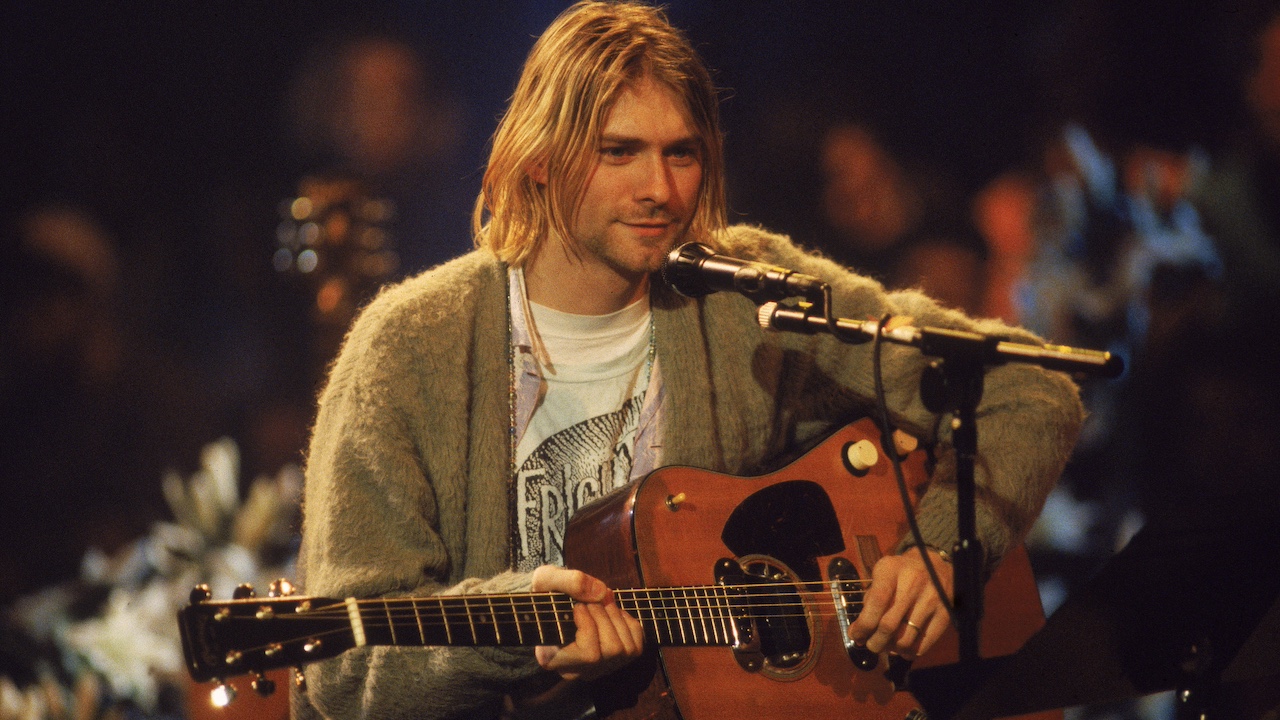
Some of the most iconic live moments in Nirvana’s career were those shrouded in doubt and uncertainty. No-one, for instance, really knew if Kurt Cobain & co. were going to show for their Reading headline slot in 1992, rumours flying around that it was never going to happen because the band had already split up and that Cobain was too ill, a theory mocked when the frontman had himself pushed onstage in a wheelchair come Sunday evening.
Similarly, there was much fretting about the grunge superstars’ MTV Unplugged performance, an all-time classic set that turned 30 this week. This one, though, was less about whether Cobain, Krist Novoselic and Dave Grohl would actually show and more about if they had the chops to pull it off. Bar some of the more restrained moments on their records, no-one had ever really heard Nirvana raw and stripped-down. Nirvana acoustic was just not a thing: Nirvana were the loudest and most aggressively chaotic live band on the planet, Cobain’s howl rendering PAs useless, Dave Grohl’s powerhouse drumming style the sort that could register on the Richter scale. Nothing about them screamed: “MTV Unplugged material”.
And yet, they were bang up for it, keen to show they were a more dynamic and nuanced band than their quiet-loud-quiet-loud-super-loud smash hits. “Kurt wanted to prove to himself that he could do this in an artistically successful way,” Geffen Records A&R Mark Kates told The Ringer. “His creative mind at that time was going in a more quieter direction.”
Just because they were willing to play the game doesn’t mean they didn’t rework some of the rules, though. MTV Unplugged was usually viewed in the same way as any other mainstream music show, in that you play the hits. Even Pearl Jam, who had already began to show their discomfort at following traditional norms, had acquiesced, playing straightforward acoustic renditions of Even Flow and Alive in their set. But Nirvana pretty much ignored anything that could be considered amped-up in their catalogue – the only songs in their MTV Unplugged set that could be considered rock-ish were pared-down versions of Come As You Are and On A Plain – and instead honed in on more introspective cuts from their records with the rest of the show taking in surprise cover choices of mostly-unknown songs. These included three songs by cult US rockers the Meat Puppets, whose brothers Curt and Cris Kirkwood joined Nirvana onstage for the tracks, The Man Who Sold The World, a David Bowie song that was considered a deep cut at that point, a track by blues pioneer Lead Belly and a cover of a track by Scottish indie duo The Vaselines. Basically, if these covers were a mixtape, it would’ve been titled Who And What?. It was the ultimate move in how not to yield to corporate pressure. “We knew we didn’t want to do an acoustic version of Teen Spirit,” Grohl later said. “That would’ve been horrendously stupid. We felt it would be better if we found other songs.”
MTV Unplugged producer Alex Coletti recalls telling his bosses what Nirvana had in mind. “I said to MTV, ‘They’re going to bring some guests on,'” he told Guitar World. “At first everybody’s eyes lit up, like, ‘Who’s it gonna be?’. They wanted to hear ‘right’ names like Eddie Vedder or Tori Amos. When I said, ‘the Meat Puppets’, it was like, ‘Oh great. They’re not doing any hits and they’re inviting guests who don’t have any hits to come play. Perfect.’”
But Nirvana’s outside-the-box approach proved to be a masterstroke, dramatically expanding the perception of the band that people considered Nirvana to be, a band who still sounded exactly like themselves not playing any of their anthems, not using any distortion pedals, not relying on the sonic violence. Instead, Nirvana’s MTV Unplugged set pulled on the more emotional characteristics of their music, on the vulnerability and more fragile and unsettling side of their sound. Nowhere was that more deftly illustrated than on poignant closer Where Did You Sleep Last Night. Kurt had already been involved in a version of the Lead Belly song committed to tape, playing guitar on a take by Mark Lanegan for the Screaming Trees singer’s 1990 solo debut. But this one was all his own, a version full of menace and fear and dread that works precisely because it never breaks out into a full rock wig-out, his cavernous vocal screech at the end almost shocking in the acoustic setting.
Coletti remembered asking the band if there was anything else they wanted to play just after that song. “I said, “Now’s the time. You’re not gonna get to do this again,” he told The Ringer. “And they listened and they weren’t just dismissing it. And I threw out Verse Chorus Verse, and there was one song that was a B-side that Dave sang, Marigold. So honestly, I wasn’t doing what MTV wanted, which was getting hits. I was throwing out obscure stuff. Just stuff I thought would work acoustic and be cool. But I wasn’t gonna come out and say, “Try Teen Spirit.” But Kurt thought about it and he said, “I don’t think we can top the last song.” And the minute he said that, I pressed the button on my headset and said, “We’re wrapped.”
A classic MTV Unplugged set was complete. It aired on MTV a few weeks later but by the time the record was released in November, 1994, Kurt Cobain had already taken his own life. With Nirvana’s MTV Unplugged set, he’d left us another astounding thing to remember him by.







